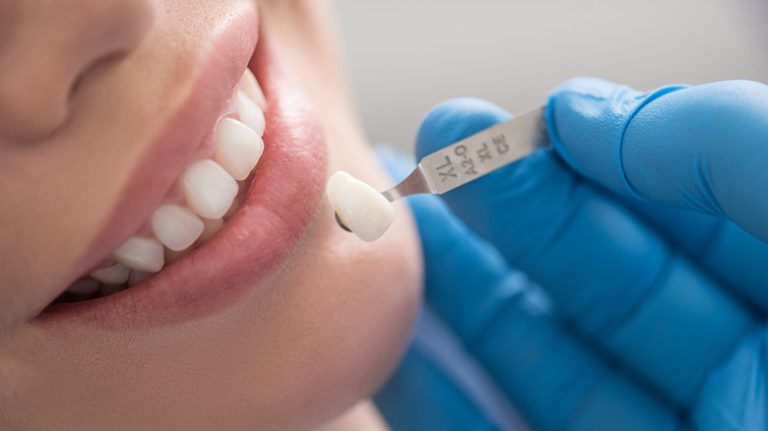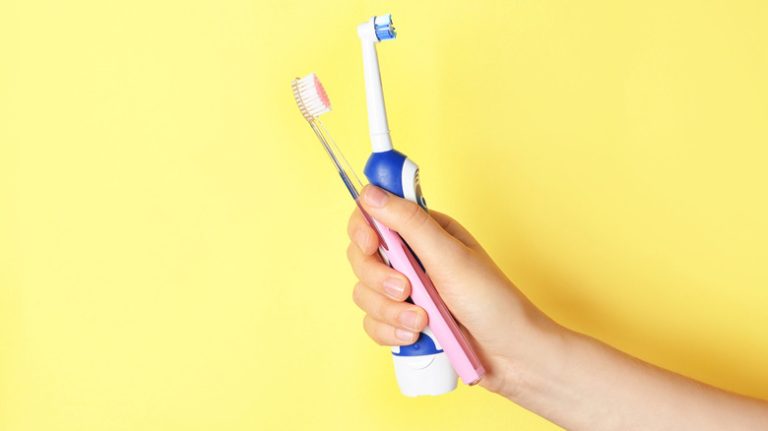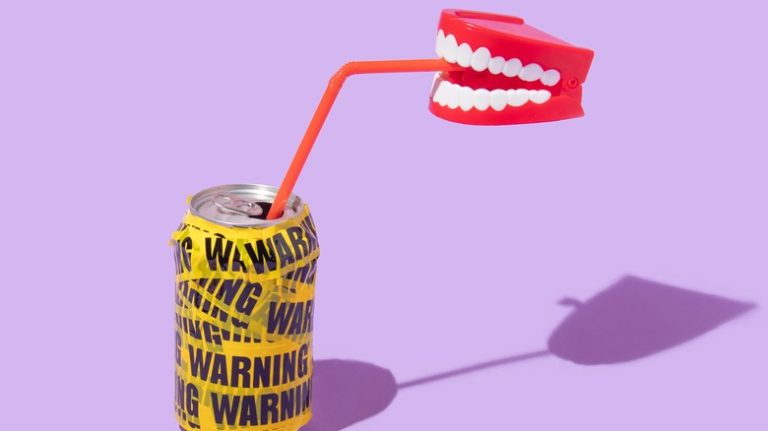Have you ever awoken from a night of deep sleep to find your teeth hurting for no apparent reason? A variety of factors can cause tooth pain. Some are simple to resolve on your own, while others require a visit to your dentist.
Teeth are an essential part of our bodies that are frequently overlooked until that inner voice reminds you to brush and floss twice daily. You may believe you are following the guidelines for keeping your smile healthy. But as the Cirocco Dental Center, brushing twice a day, even with the best toothpaste, isn’t the only thing you need to do to maintain your pearly whites and avoid expensive dental bills. Indeed, to keep your smile in tip-top condition, you might need to break some bad habits that are causing harm. In some cases, you may be unaware of the damage that’s occuring, as it may not become apparent for months or years. That’s why we’re here to give you an early warning about the things that are hurting your teeth.
What you consume may hurt your teeth

Over the years, most people may have heard that overeating candy and other sweet treats causes tooth decay. Sugary drinks, red wine, and coffee are well-known beverages that have a bad reputation for staining tooth enamel, per Gefrey Rasmussen, DDS. However, many unexpected foods and drinks can be just as harmful as the obvious ones.
According to Healthline, plaque grows on the surface of the teeth when you consume anything sugary. This film harbors bacteria and creates an acidic environment, which damages tooth enamel and leads to cavities. And some foods you might not expect to wreak havoc on your mouth can cause damage. Bread, believe it or not, degrades into sugar as your saliva works to dissolve the starches. Bread also hides in the crevices of your teeth and gums. Choosing less sugary bread options, such as whole wheat, may be beneficial.
If you have a salty snack craving and potato chips are your go-to, think again. Advanced Family Dental and Orthodontics mentions that potato chips contain a lot of starch. The bacteria produced by the starch create an acidic environment in your mouth, especially where those pesky crumbs may get stuck. As a result, potato chips are another unexpected food that can harm your teeth.
Cough drops can cause tooth decay
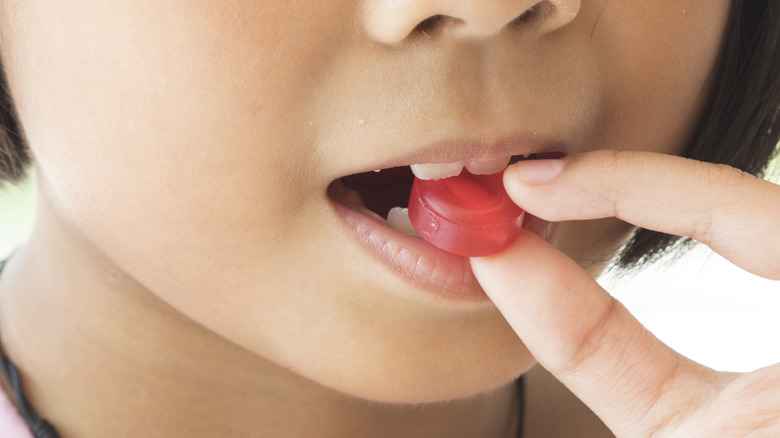
When you’re sick, it’s easy to become obsessed with reading medicine labels to find ingredients that will help you feel better. This is especially true if you have a cough that keeps you awake at night and prevents you from getting the rest your body requires to heal. However, if you’re looking for cough drops to relieve a persistent cough, you should know what they can do to your teeth. According to family dentist Janice Pliszczak, most cough drops have a high sugar content and can harm your teeth and gums, especially if you allow them to dissolve slowly in your mouth. Even if cough drops are sugar-free, they can still be acidic, increasing the risk of tooth decay. Cough drops can also stain teeth and increase bacteria in the mouth, causing tooth enamel to deteriorate (via Eugene Dental Group). For these reasons, Janice Pliszczak advises pursuing other cough-soothing methods such as honey and warm tea instead of cough drops.
Don’t use your teeth as a tool

LightField Studios/Shutterstock
Teeth may sometimes seem like an ideal tool, especially when your hands are full. Although we’ve all been tempted to open, carry, or cut something with our teeth, Family Dentistry on Montford suggests that doing so can result in tooth damage or even breakage. The same is true of chewing on random objects like pens or pencils. This habit can be a stress reliever that most people do without realizing it. However, though teeth are designed for chewing food, chewing on foreign objects with your teeth is risky for several reasons. To begin with, chewing non-food items could pose a choking hazard for both children and adults. Chewing on foreign objects can also cause your teeth to chip, crack, and even weaken or become brittle (via Byers Station Dental). In addition, it can cause jaw pain or damage the gums.
If you find yourself chewing on something other than food, the American Dental Association (ADA) recommends sugarless gum. This kind of chewing benefits oral health because it increases saliva production and can aid in diluting acids that cause plaque buildup and, eventually, cavity development.
How a glass of wine every night can hurt your teeth
Krakenimages.com/Shutterstock
For some people, a glass of wine is a must after a long stressful day, and in limited quantities, wine can provide numerous physical and mental health benefits (via PureWine). However, the American Academy of Implant Dentistry (AAID) states that wine is one of the most harmful drinks to the health of your teeth. One reason is that the acidity in wine can dissolve tooth enamel, creating a breeding ground for bacteria to form and adhere to the tooth’s surface.
Furthermore, don’t be fooled into thinking that white wine is harmless for your teeth just because it doesn’t have a staining red hue. AAID cautions against this assumption, stating that white wine is more acidic. So, while it may not cause the same teeth-staining problems, it will damage enamel — and in turn, this damage may allow other food and drinks to cause increased staining or discoloration as the enamel barrier is broken.
All this said, if you can’t give up your nightly glass of wine, AAID recommends rinsing your mouth with water after you finish, waiting at least half an hour before brushing your teeth, or chewing sugar-free gum to increase saliva production, which will reduce acidity in your mouth. Additionally, eating cheese with wine may help absorb some of the acid (via WebMD).
Eating disorders and self-induced vomiting are detrimental to oral health
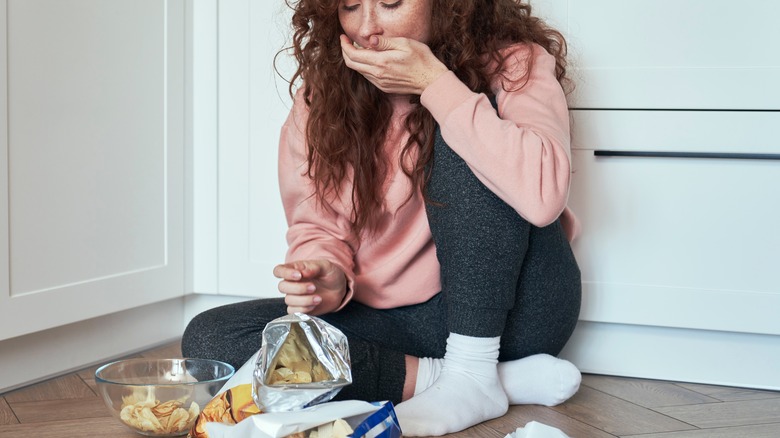
gpointstudio/Shutterstock
Eating disorders and other conditions that cause repeated vomiting episodes can cause damage to the teeth over some time. Indeed, certain oral health challenges or changes may be early indication that someone may have an eating disorder (via National Eating Disorders). One’s dental health may suffer significantly due to the unhealthy behaviors and nutritional deficiencies frequently accompanying disordered eating. For example, lesions in the mouth or tongue’s mucosal lining may be caused by foreign objects that induce vomiting (per BDJ Team). And Eating Disorder Hope mentions that chronic vomiting exposes the teeth to an excess of stomach acid, causing teeth to decay prematurely and, in some cases, causing irreversible damage. Damage can range from chipping to rotting or loose teeth, mouth sores, swelling, and dehydration.
If you need help with an eating disorder, or know someone who is, help is available. Visit the National Eating Disorders Association website or contact NEDA’s Live Helpline at 1-800-931-2237. You can also receive 24/7 Crisis Support via text (send NEDA to 741-741).
Pregnancy increases the risk of gingivitis and cavity development

Krakenimages.com/Shutterstock
Many changes occur in the human body during pregnancy, and some of these changes can impact oral health. Hormonal changes are commonly the cause of bleeding, swollen and sore gums, as well as gingivitis. According to the Centers for Disease Control and Prevention (CDC), as many as three out of four pregnant women will develop gingivitis. Furthermore, the American Academy of Pediatrics emphasizes the seriousness of untreated gingivitis and its impact on pregnancy if left untreated. Periodontitis, linked to preterm birth and low birth weight, can develop quickly from gingivitis.
In addition, some women experience morning sickness during pregnancy, which may cause a decrease in brushing and flossing if your oral health routine provokes nausea (via March of Dimes). Furthermore, nausea and vomiting increase the production of acid in the oral cavity, increasing the risk of tooth decay. For all these reasons, dental care must be received before, during, and after pregnancy to maintain a healthy smile and help prevent oral pregnancy complications.
Maintaining a pearly white smile may hurt your teeth
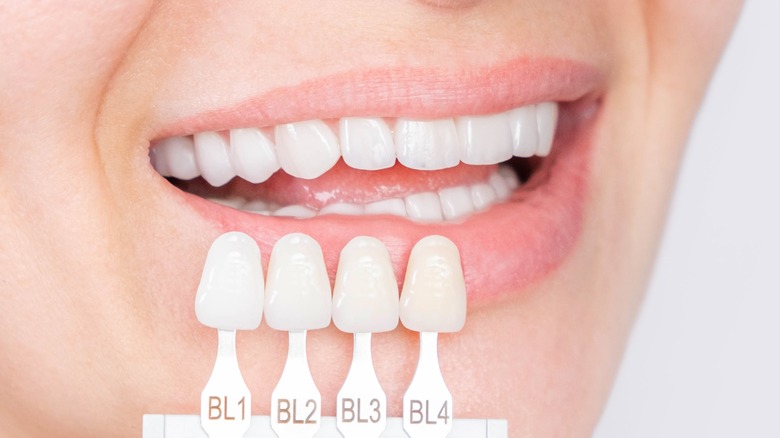
Natali Kuzina/Shutterstock
After years of staining our teeth with coffee, tobacco, tea, and other foods bad for tooth color, many of us can now smile brightly thanks to teeth whitening products. And fortunately, teeth whitening is generally safe and effective when done under the supervision of a dentist (via Westermeier Martin Dental Care). Tooth over-bleaching, on the other hand, is posing a new challenge for dentists. According to a study published in Clinical Case Reports, this new problem is known as bleachorexia. This is an addictive condition in which people use teeth whitening products and mouthwash excessively, causing damage to the enamel as well as the gums and surrounding tissue.
Furthermore, Old Mt. Pleasant Dentistry cautions that the chemicals in whiteners may increase tooth sensitivity to the temperature of the food or drink you consume, though this sensitivity should subside within a few days of using the product. And, too, the site notes that overusing whiteners can lead to results opposite of what you want, because these products can make your teeth more translucent, potentially causing them to appear dark rather than bright white.
You may hurt your teeth if you have an oral piercing
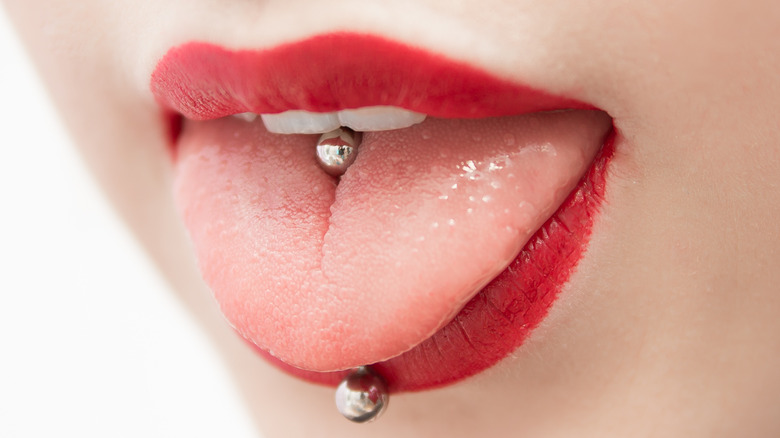
kapichka/Shutterstock
Oral piercings come in various styles and are frequently used for personal expression. But on the downside, oral piercings can harm your teeth and general health. According to a study published in Clinical Oral Investigations, you should be aware of any potential long-term effects from oral piercings. Most piercings unintentionally rub against the cheeks, gums, and teeth. You may not notice any untoward effects, but these piercings were shown to increase the odds of developing cracks in the enamel and a decline in gum health when worn long-term.
If you must have an oral piercing, family dentist Dr. Jaime Neill recommends getting one that fits snugly to the tongue and is made of an approved polymer material that is less damaging than other harder materials to the teeth and gums. Furthermore, good oral hygiene is essential for infection prevention especially immediately following the piercing — the mouth is full of bacteria, and when there is a break in the protective barrier, bacteria can enter and cause infection or severe swelling of the tongue. Finally, Dr. Neill recommends changing out the original piercing with one that will provide a closer fit after the swelling subsides, rinsing regularly with mouthwash, and taking out the jewelry periodically to scrub your tongue.
You might be hurting your teeth if you frequently bite your nails
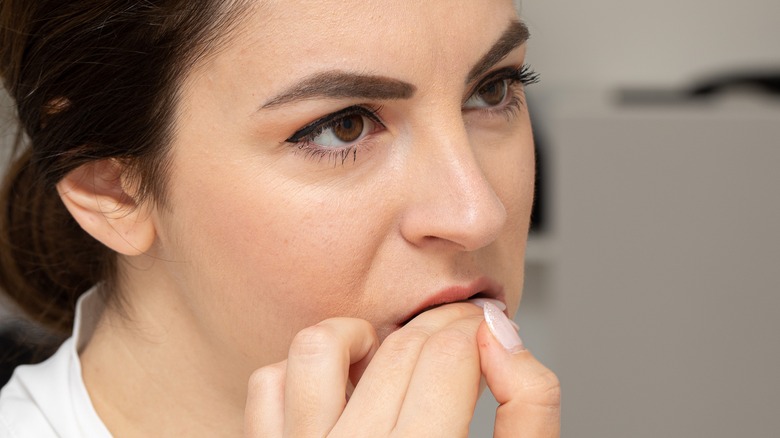
sruilk/Shutterstock
Think about everything you come into contact with throughout the day. Do you want to put it all in your mouth? Probably not. Your hands, fingers, and nails are infested with germs, no matter how hard you try to keep them clean. But biting your nails can harm your teeth in addition to spreading germs. If you have this bad habit, you’re not alone. According to Summit Dental Health, nearly half of the population develops a nail-biting habit by the time they reach their adolescent years. This happens for various reasons, including anxiety, stress, boredom, or bothersome torn or jagged nails.
Biting your nails can introduce pathogens into your mouth that contribute to gum disease. This habit can also damage your teeth more directly, though. Nail biting can result in shifting, cracking, and chipping of your teeth, especially if you persist in the habit over a long period (via Emergency Dentists). This is because when you bite your nails, they grow stronger and harder over time, putting even more strain on your teeth. In addition, nail biting can lead to teeth grinding, which will cause additional problems with teeth alignment and potentially jaw and headache pain (per Summit Dental Health).
The ADA offers a few suggestions to help break the habit of nail biting. Keeping your nails manicured and short can help reduce the desire to nibble on them. Furthermore, applying polish with a bitter taste may help to suppress the urge. Finally, you can consult your dentist; they may have other suggestions to help you overcome the temptation.
Brushing your teeth too hard can hurt them

Prostock-studio/Shutterstock
Brushing your teeth is one of the most basic ways to keep your teeth healthy. But can something as simple as brushing be done incorrectly? Unfortunately, it is possible to brush your teeth too hard, and the vigorous brushing that you believe provides a better cleaning may actually damage your teeth. Dental Associates states that using too much force can harm your gums and, if not caught in time, this can lead to gum recession, requiring surgery. In addition, the added force may dull your smile, as a hard brushing can damage the enamel on the surface of your teeth (via Exceptional Dentistry).
If you notice blood after spitting out your toothpaste, or increased sensitivity, you are most likely brushing too vigorously. Dental Associates believes using a soft bristle brush or an electric toothbrush is best. However, follow the instructions carefully — electric brushes can do the work for you if you use them correctly. Finally, if you are unsure whether you are damaging your teeth by brushing too hard, seek advice from your dentist or hygienist.
Chewing ice can hurt your teeth
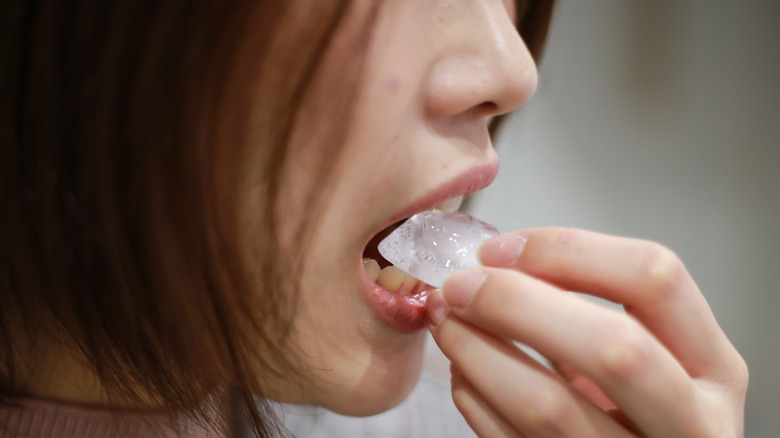
yamasan0708/Shutterstock
Chewing on ice may appear to be a good way to cut calories while satisfying a chewing need or craving. Although chewing on ice may help relieve hunger, cravings, or stress, it is incredibly harmful to your teeth for several reasons. According to WebMD, hard cubes can crack or chip your teeth and irritate the gums around the teeth because most cubes have sharp edges when broken down by chewing. Additionally, if you have dental fillings, be aware they can easily crack when chewing on a hard ice cube (per Beavers Dentistry).
If you have a habit of eating ice, try a safer alternative. Colgate recommends allowing ice to melt in your mouth before chewing it. Furthermore, if you crave restaurant ice, consider that ice machines are notorious for harboring bacteria and thus may not be the best option for satisfying that craving. If everything else fails, try shaved ice or tiny soft cubes. It’s also worth noting that if you consistently crave ice, it could indicate an underlying medical problem such as iron deficiency anemia or other nutritional deficits — so if this is a habit you can’t shake, you may want to visit your doctor (via Beavers Dentistry).
You may have tooth pain with a sinus infection
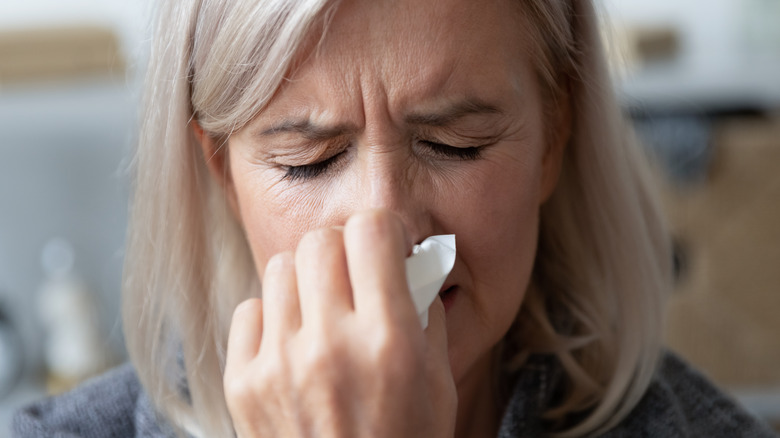
fizkes/Shutterstock
It may be challenging to differentiate between sinus pain and toothaches, as both types of pain present similarly. According to the British Dental Journal, tooth pain can be caused by an infection in any sinuses. This is because the nerves in the gums, teeth, and sinuses are all linked. Pain signals are sent to the brain when these nerves are irritated and inflamed, such as during a sinus infection. As a result, you will experience discomfort in your sinuses, gums, and teeth. Indeed, the largest sinus cavity is on either side above the back upper teeth, so it should not be surprising that an infection here could cause pain in the upper jaw or back teeth (via Mayo Clinic).
If you’re feeling pain and are unsure whether it originates in your mouth or in your sinuses, Highland Dental Group advises how to distinguish between the two: If the discomfort or pressure is on both sides of your mouth or behind your cheekbones, you most likely have a sinus problem. However, you probably have a toothache if you have localized pain or pain when pressing on a single tooth.
Stress can hurt your teeth

Cast Of Thousands/Shutterstock
An occasional stressful day is not uncommon. Life events happen, and not all moments are sunshine and rainbows. However, chronic stress can hurt your teeth for various reasons. According to University General Dentists, teeth grinding has been linked to stress. The more stressful your day, the more likely you will grind your teeth. You may do this unknowingly, and the consequences may surprise you. You are likely to do this while sleeping, which can wear down, chip, or even cause pain in your jaw when you wake up. Pain and damage to your temporomandibular joint (TMJ) can also develop due to teeth grinding.
Stress is also associated with immune system stress, leading to oral health issues (per Olympia Fields Dental Associates). A strong immune system is required to fight bacteria and eliminate germs. If bacteria become too powerful in your mouth, gum disease can develop, leading to gingivitis and tooth decay. Furthermore, stress causes some people to make poor food choices, binge eat, or increase alcohol consumption. All these factors can raise the risk of developing oral health.
You could be hurting your teeth if you don’t drink enough water

Marian Weyo/Shutterstock
Drinking plenty of water daily is critical to your overall health. The amount that should be consumed varies by individual and is determined by someone’s activity level. According to the Harvard T.H. Chan School of Public Health, the National Academy of Medicine issued general recommendations that men take in 13 cups of fluids daily, and women should have 9; however, more is recommended for people who have increased metabolic usage, such as during exercise, working outside in the heat, or even if you are sick and have a high temperature.
You may be wondering why water is so vital to dental health. Southern Dental Fort Smith explains that drinking water helps your body produce saliva. Saliva is needed to help flush bacteria away from teeth and gums. In addition, water is calorie- and sugar-free, and in America, localities often add tooth-protecting minerals like fluoride to their drinking water. So, instead of reaching for a sugary drink, sip on some water first to maintain a healthy smile.
